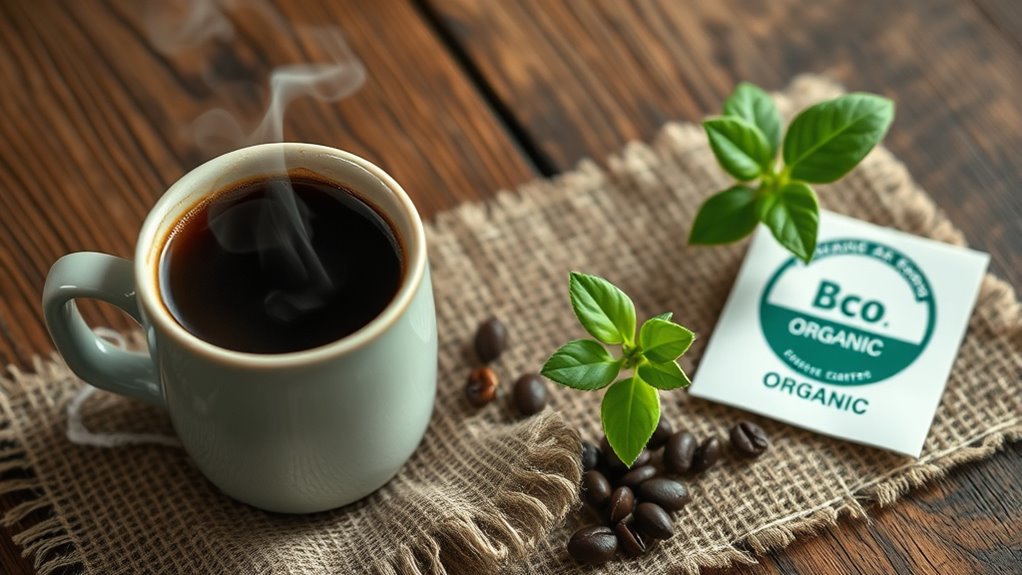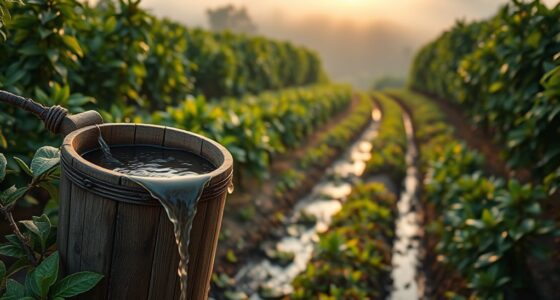Choosing organic coffee means you get a beverage made without synthetic pesticides, herbicides, or fertilizers, ensuring it’s pure and healthy. Certified organic standards guarantee your coffee is grown sustainably, protecting soil health and supporting biodiversity. These certifications involve strict audits to maintain transparency and environmental responsibility. By opting for organic, you also reduce pollution and support eco-friendly farming practices. Keep exploring to learn more about how organic coffee benefits both you and the planet.
Key Takeaways
- Organic coffee is grown without synthetic pesticides, herbicides, or fertilizers, ensuring a chemical-free beverage.
- Certification guarantees adherence to strict USDA standards through audits and documentation.
- Organic farming promotes soil health, biodiversity, and reduces chemical runoff, benefiting the environment.
- It minimizes pollution and carbon footprint, protecting wildlife and ecological balance.
- Choosing organic coffee supports sustainable farming practices and transparent supply chains for consumer trust.

Organic coffee is grown without synthetic pesticides, herbicides, or fertilizers, so you get a cleaner, chemical-free beverage. When you choose organic coffee, you’re selecting a product that meets strict standards set by certifications like USDA Organic. This certification verifies that the coffee has been produced following rigorous guidelines focused on sustainable farming practices, ensuring that the environment and farmers’ health are prioritized.
Organic coffee is cultivated without synthetic chemicals, ensuring a pure, environmentally friendly beverage.
Organic certification isn’t just a label; it’s a guarantee that the coffee adheres to specific organic standards, including the prohibition of genetically modified organisms (GMOs). These standards promote a transparent supply chain, with detailed audits and documentation that verify compliance from farm to cup.
By opting for organic coffee with the USDA Organic seal, you support farming methods that foster soil health and encourage biodiversity. Unlike conventional methods that rely heavily on chemical inputs, organic farming preserves the natural balance of ecosystems. This approach reduces chemical runoff, which can pollute water sources and harm wildlife.
Instead, organic farmers use natural composts and crop rotations to maintain soil fertility, leading to healthier soil and more resilient coffee plants. This focus on soil conservation ensures that land remains productive for future generations, embodying sustainable farming principles.
Choosing organic coffee also contributes to environmental protection. Certified organic farms implement practices that minimize pollution and reduce their carbon footprint. They actively protect local biodiversity by avoiding synthetic chemicals that can harm insects, birds, and other wildlife.
This commitment to environmental stewardship aligns with organic standards designed to promote a sustainable, healthier planet. When you see the USDA Organic label on your coffee package, you’re supporting a system that values ecological balance and long-term sustainability.
Organic certification isn’t handed out lightly. It involves thorough audits and strict documentation processes to confirm that farms meet all organic standards. This rigorous oversight ensures that your coffee is genuinely chemical-free and produced in an environmentally responsible way.
In addition, organic farming practices often include soil health initiatives that improve land resilience and productivity over time. By choosing organic coffee, you’re not only enjoying a pure, flavorful beverage but also contributing to a system that values transparency, integrity, and sustainability. Every cup becomes a small act of environmental protection, helping to promote biodiversity, safeguard soil health, and support sustainable farming practices.
In the end, organic coffee isn’t just better for your health — it’s a conscious choice to protect the planet.
Frequently Asked Questions
What Is Organic Coffee Certification?
Organic coffee certification proves that your coffee beans are grown without synthetic pesticides, herbicides, or fertilizers. You’ll see the USDA Organic Seal, which shows farms meet strict standards through inspections and soil tests.
This certification takes years to obtain, ensuring proper practices. It also means your coffee is processed separately to prevent contamination.
Choosing certified organic coffee supports sustainable farming and guarantees you’re getting a pure, environmentally friendly product.
What Are the USDA Requirements for Organic Coffee?
You want to know the USDA requirements for organic coffee. They mandate that the coffee must be grown without synthetic pesticides, herbicides, or fertilizers for at least three years before certification.
You need to follow strict standards on soil health, crop rotation, and pest control, keep detailed records, and undergo annual audits.
Plus, no GMOs are allowed, and processing must prevent contamination with non-organic products.
Are There Health Benefits to Organic Coffee?
You might notice health benefits from drinking organic coffee because it contains fewer pesticide residues, reducing your chemical exposure. Plus, it’s higher in antioxidants, which support your immune system.
The natural farming practices improve soil health, leading to beans with better flavor and nutritional value. Choosing organic also means you’re avoiding GMOs, helping protect ecological diversity and potentially lowering your risk of ingesting harmful chemicals.
Is Organic Certification Worth It?
You’re wondering if organic certification is worth it. It really depends on what you value—if you prioritize environmental benefits, chemical-free farming, and better flavor, then yes, certification is worth it.
It offers verified quality, giving you confidence in what you’re drinking. While it involves costs for farmers, for you, it means enjoying coffee that’s healthier for you and better for the planet.
What Are the Standards for Organic Coffee?
You want to know the standards for organic coffee. They include strict rules from the USDA’s National Organic Program, like avoiding synthetic fertilizers, pesticides, and GMOs.
Farms must maintain healthy soils through crop rotation and composting, undergo regular inspections, and keep detailed records for at least three years.
Processing must follow strict guidelines, using dedicated equipment or thorough cleaning to prevent contamination, ensuring your coffee meets organic quality and environmental sustainability standards.
Conclusion
Choosing organic coffee supports your health and the environment. By opting for certified options, you guarantee you’re getting a product free from harmful chemicals and pesticides. Plus, you’re helping sustain sustainable farming practices that protect ecosystems and local communities. So, next time you enjoy your morning brew, remember that your choice can make a positive impact. Embrace organic coffee for a better, healthier planet—and a richer, more flavorful cup every time.









